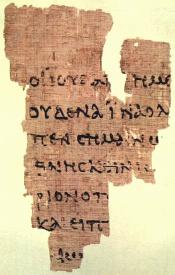Difference between revisions of "John Rylands Fragment"
From Conservapedia
(New page: right The '''John Rylands Fragment''' (P52) is the oldest known manuscript fragment of the New Testament. This papyrus codex containing John 18:...) |
(→External links: Replace three cats. with one new one.) |
||
| (5 intermediate revisions by one other user not shown) | |||
| Line 1: | Line 1: | ||
| − | [[Image:Rylands Papyrus (P52).jpg| | + | [[Image:Rylands Papyrus (P52).jpg|thumb|Rylands papyrus, (P52) recto (front side); containing on this one side part of St. John's Gospel verses 31-33, on the other of verses 37-38 of chapter xviii.]] |
The '''John Rylands Fragment''' (P52) is the oldest known manuscript fragment of the [[New Testament]]. This papyrus codex containing [[John]] 18:31-33 and 37-38, was found in [[Egypt]] by Bernard P. Grenfell. It went unnoticed among many other manuscript fragments until 1934, when C. H. Roberts recognized that it contained part of the Gospel of John. | The '''John Rylands Fragment''' (P52) is the oldest known manuscript fragment of the [[New Testament]]. This papyrus codex containing [[John]] 18:31-33 and 37-38, was found in [[Egypt]] by Bernard P. Grenfell. It went unnoticed among many other manuscript fragments until 1934, when C. H. Roberts recognized that it contained part of the Gospel of John. | ||
== Some Facts == | == Some Facts == | ||
| − | * Current Location: John Rylands Library, Manchester, [[England | + | * Current Location: John Rylands Library, Manchester, [[England]]. |
* Date of Acquisition: 1920. | * Date of Acquisition: 1920. | ||
* Acquirer: Bernard P. Grenfell. | * Acquirer: Bernard P. Grenfell. | ||
| Line 12: | Line 12: | ||
:::: ''... This was to fulfill the word which [[Jesus]] had spoken to show by what death he would die. Pilate entered the praetorium again and called Jesus, and said to him, "Are you the king of the Judeans?"'' | :::: ''... This was to fulfill the word which [[Jesus]] had spoken to show by what death he would die. Pilate entered the praetorium again and called Jesus, and said to him, "Are you the king of the Judeans?"'' | ||
| − | The oldest complete [[Bible]]s are the [[Codex Vaticanus]] and the [[Codex Sinaiticus]]. | + | The oldest complete [[Bible]]s are the [[Codex Vaticanus]] and the [[Codex Sinaiticus]]. |
| + | |||
| + | == See also == | ||
| + | |||
| + | *[[The Gospels]] | ||
| + | *[[Gospel of John]] | ||
| + | *[[Dead Sea Scrolls]] | ||
== External links == | == External links == | ||
*[http://www.biblefacts.org/history/p52.html A Fragment of the Gospel of John] | *[http://www.biblefacts.org/history/p52.html A Fragment of the Gospel of John] | ||
| − | *[http://www.skypoint.com/members/waltzmn/ManuscriptsPapyri.html ] | + | *[http://www.skypoint.com/members/waltzmn/ManuscriptsPapyri.html New Testament Manuscripts] |
| − | + | *[http://www.library.manchester.ac.uk/specialcollections/collections/stjohnfragment/ An unpublished fragment of the fourth gospel] The John Rylands University Library, The University of Manchester. | |
| − | [[Category: | + | [[Category:Biblical Documents]] |
| − | + | ||
| − | + | ||
Latest revision as of 04:25, October 4, 2008
The John Rylands Fragment (P52) is the oldest known manuscript fragment of the New Testament. This papyrus codex containing John 18:31-33 and 37-38, was found in Egypt by Bernard P. Grenfell. It went unnoticed among many other manuscript fragments until 1934, when C. H. Roberts recognized that it contained part of the Gospel of John.
Some Facts
- Current Location: John Rylands Library, Manchester, England.
- Date of Acquisition: 1920.
- Acquirer: Bernard P. Grenfell.
- Approximate Date: c. 125–150 AD.
- Language: Greek.
- ... This was to fulfill the word which Jesus had spoken to show by what death he would die. Pilate entered the praetorium again and called Jesus, and said to him, "Are you the king of the Judeans?"
The oldest complete Bibles are the Codex Vaticanus and the Codex Sinaiticus.
See also
External links
- A Fragment of the Gospel of John
- New Testament Manuscripts
- An unpublished fragment of the fourth gospel The John Rylands University Library, The University of Manchester.
